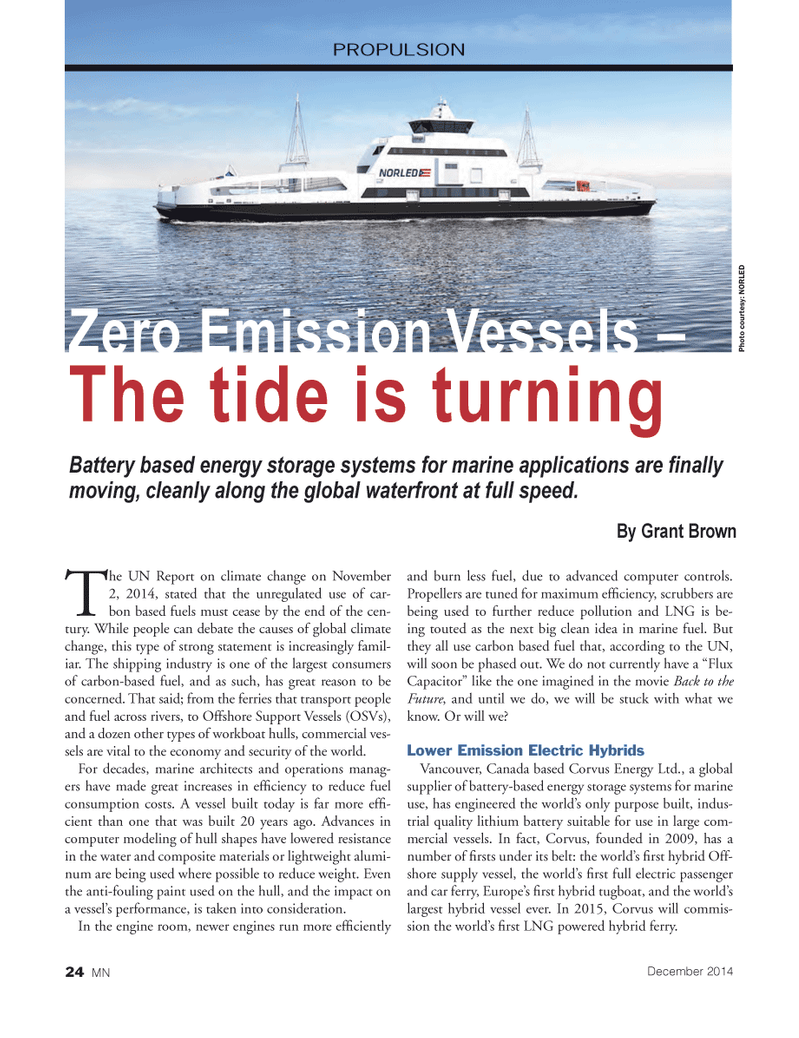
Page 24: of Marine News Magazine (December 2014)
Salvage & Spill Response
Read this page in Pdf, Flash or Html5 edition of December 2014 Marine News Magazine
The UN Report on climate change on November 2, 2014, stated that the unregulated use of car- bon based fuels must cease by the end of the cen- tury. While people can debate the causes of global climate change, this type of strong statement is increasingly famil- iar. The shipping industry is one of the largest consumers of carbon-based fuel, and as such, has great reason to be concerned. That said; from the ferries that transport people and fuel across rivers, to Offshore Support Vessels (OSVs), and a dozen other types of workboat hulls, commercial ves- sels are vital to the economy and security of the world. For decades, marine architects and operations manag- ers have made great increases in efÞ ciency to reduce fuel consumption costs. A vessel built today is far more efÞ -cient than one that was built 20 years ago. Advances in computer modeling of hull shapes have lowered resistance in the water and composite materials or lightweight alumi- num are being used where possible to reduce weight. Even the anti-fouling paint used on the hull, and the impact on a vesselÕs performance, is taken into consideration. In the engine room, newer engines run more efÞ ciently and burn less fuel, due to advanced computer controls. Propellers are tuned for maximum efÞ ciency, scrubbers are being used to further reduce pollution and LNG is be- ing touted as the next big clean idea in marine fuel. But they all use carbon based fuel that, according to the UN, will soon be phased out. We do not currently have a ÒFlux CapacitorÓ like the one imagined in the movie Back to the Future , and until we do, we will be stuck with what we know. Or will we? Lower Emission Electric HybridsVancouver, Canada based Corvus Energy Ltd., a global supplier of battery-based energy storage systems for marine use, has engineered the worldÕs only purpose built, indus- trial quality lithium battery suitable for use in large com- mercial vessels. In fact, Corvus, founded in 2009, has a number of Þ rsts under its belt: the worldÕs Þ rst hybrid Off- shore supply vessel, the worldÕs Þ rst full electric passenger and car ferry, EuropeÕs Þ rst hybrid tugboat, and the worldÕs largest hybrid vessel ever. In 2015, Corvus will commis- sion the worldÕs Þ rst LNG powered hybrid ferry. PROPULSIONZero Emission Vessels ? The tide is turning The tide is turning Battery based energy storage systems for marine applications are Þ nally Battery based energy storage systems for marine applications are Þ nally moving, cleanly along the global waterfront at full speed. moving, cleanly along the global waterfront at full speed. By Grant Brown By Grant Brown Photo courtesy: NORLED December 201424 MNMN Dec14 Layout 18-31.indd 24MN Dec14 Layout 18-31.indd 2411/25/2014 10:20:01 AM11/25/2014 10:20:01 AM

 23
23

 25
25
